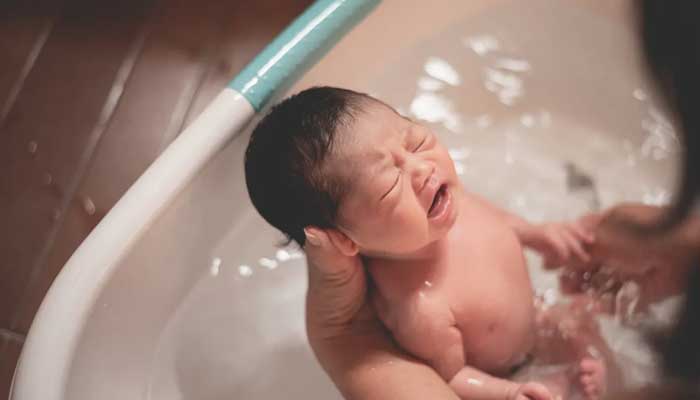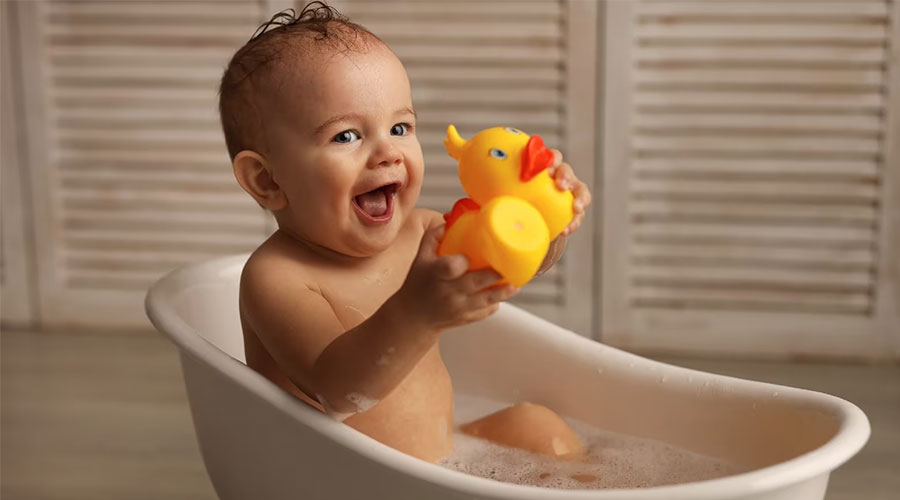Parenting guide: How often to bathe a newborn
Research studies reveal that overexposure to water can dehydrate newborns' skin

Parenting comes with great joy and it also brings a number of responsibilities to the new parents, among which, baby health and hygiene tops the list.
Even though taking a bath might be a nightly ritual for you, doctors don't advise giving babies a bath every day.
Overexposure to water can dehydrate their skin and exacerbate skin problems like eczema. On the other hand, neglecting to bathe your child frequently enough might exacerbate eczema and cause other diseases.
It's a fine line to walk. However, taking a bath is probably not the whole issue: Even when there isn't a "bath," the usage of bath goods, such as lotions with colours or perfumes, can react with babies' skin and aggravate eczema.
So how often should you bathe a newborn? Read on for expert advice.

When To Bath a Newborn for the First Time
The American Academy of Paediatrics (AAP) advises parents to wait at least 6 hours after their baby is born before giving him or her their first bath, even if it is possible to wait a whole day. There are a variety of advantages to delaying your baby's bath, including:
• Helping your baby keep their body temperature stable and preventing hypothermia
• Helping stabilize your baby's blood sugar
• Improving breastfeeding success if you will be nursing
• Encouraging bonding with you and any other caregivers
• Helping moisturize your baby's skin
• Preserving beneficial bacteria on your baby's skin
The AAP's position on delaying the newborn bath is well known in most hospitals, and many hospitals have a policy for a delayed bath, but many don't. In either case, if you are worried about delaying your newborn's first bath, you can speak with professionals in advance.
When your infant is old enough to take a bath at home, you should continue using sponge baths until the umbilical cord stump falls off, which normally happens a few weeks after delivery. Additionally, sponge baths are a must until circumcision incisions have healed.
How Often You Should Bath Your Newborn
Most experts concur that parents can bathe their infants three times per week without risk. Nevertheless, there is no absolute guideline for how frequently to bathe a baby. The AAP states that a newborn only needs three baths a week, but you are free to bathe your child even less frequently if you like.
Generally speaking, you should bathe your infant when they are filthy or when you see that recognisable "cheese" beginning to form in their skin folds. As newborns grow bigger and become more mobile, they can undoubtedly get into some peculiar messes that may occasionally call for an additional bath. But in general, this rule is sufficient as long as the diaper area is cleaned appropriately at each diaper change.
Cleaning Your Baby Between Baths
The same way you would still use deodorant if you didn't take a shower, certain infant parts require care every day whether they receive a full bath or not.
Make sure you thoroughly clean the diaper area, particularly after using a 'poopy' or stool-filled diaper, in between the skin folds. To clean a vulva, for instance, make sure to wipe it from front to back with a fresh, unscented wipe and inspect the folds for any trapped stool.
Spend money wisely on the baby-safe lotion as well. This could serve as a helpful substitution for the bath in the bedtime routine because daily use can help avoid eczema flares. This is particularly crucial for infants who have already had eczema symptoms or have siblings or parents who also have the condition.
The Bottom Line
In conclusion, bathing your infant no more than three times per week is entirely safe, provided you wipe the diaper region carefully after each change and use moisturiser every day.








































